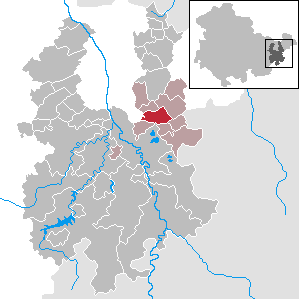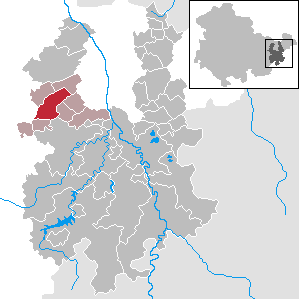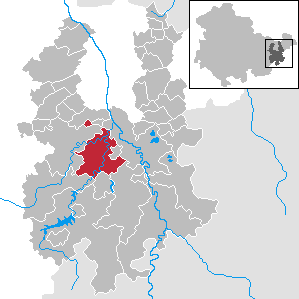
Bertha Sophie Felicitas Freifrau von Suttner was an Austro-Bohemian noblewoman, pacifist and novelist. In 1905, she became the second female Nobel laureate, the first woman to be awarded the Nobel Peace Prize, and the first Austrian laureate.
Judith of Swabia, a member of the Salian dynasty, was the youngest daughter of Emperor Henry III from his second marriage with Agnes of Poitou. By her two marriages she was Queen of Hungary from 1063 to 1074 and Duchess of Poland from 1089 to 1102.

Reuss was the name of several historical states located in present-day Thuringia, Germany. Several lordships of the Holy Roman Empire which arose after 1300 and became Imperial Counties from 1673 and Imperial Principalities in the late 18th century were ruled by the House of Reuss.
The Vogtlandkreis is a Landkreis in the southwest of Saxony, Germany, at the borders of Thuringia, Bavaria, and the Czech Republic. Neighbouring districts are Hof, Saale-Orla, Greiz, Zwickau and Erzgebirgskreis. It is the southernmost district in the state.

Gera is a city in the German state of Thuringia. With around 93,000 inhabitants, it is the third-largest city in Thuringia after Erfurt and Jena as well as the easternmost city of the Thüringer Städtekette, an almost straight string of cities consisting of the six largest Thuringian cities from Eisenach in the west, via Gotha, Erfurt, Weimar and Jena to Gera in the east. Gera is the largest city in the Vogtland, and one of its historical capitals along with Plauen, Greiz and Weida. The city lies in the East Thuringian Hill Country, in the wide valley of the White Elster, between Greiz (upstream) and Leipzig (downstream). Gera is located in the Central German Metropolitan Region, approximately 60 kilometres south of Saxony's largest city of Leipzig, 80 km east of Thuringia's capital Erfurt, 120 km west of Saxony's capital Dresden and 90 km north of Bavaria's city of Hof (Saale).
Greiz is a Kreis (district) in the east of Thuringia, Germany. Neighboring districts are Saale-Holzland, Saale-Orla, district-free city Gera, the Burgenlandkreis in Saxony-Anhalt, Altenburger Land, and the two Saxon districts Zwickau and Vogtlandkreis.

Agnes of Waiblingen, also known as Agnes of Germany, Agnes of Franconia and Agnes of Saarbrücken, was a member of the Salian imperial family. Through her first marriage, she was Duchess of Swabia; through her second marriage, she was Margravine of Austria.

Vogtland is a region spanning the German states of Bavaria, Saxony and Thuringia and north-western Bohemia in the Czech Republic. It overlaps with and is largely contained within Euregio Egrensis. The name alludes to the former leadership by the Vögte of Weida, Gera and Plauen.

Linda bei Weida is a German municipality in the Thuringian district of Greiz. It belongs to the Verwaltungsgemeinschaft of Ländereck. Linda is part of the Roman Catholic Diocese of Dresden-Meissen.

Endschütz is a German municipality in the Thuringian district of Greiz. It belongs to the Verwaltungsgemeinschaft of Ländereck.

Hilbersdorf is a German municipality in the Thuringian district of Greiz. It belongs to the Verwaltungsgemeinschaft of Ländereck and lies in upper Wipsetal.

Münchenbernsdorf is a town in the district of Greiz, in Thuringia, Germany. It is situated approximately 16 km southwest of Gera. The town is seat of a municipal association with eight members.

Weida is a town in the district of Greiz, in Thuringia, Germany, situated 12 km south of Gera on the river Weida.

Adelaide of Turin was the countess of part of the March of Ivrea and the marchioness of Turin in Northwestern Italy from 1034 to her death. She was the last of the Arduinici. She is sometimes compared to her second cousin and close contemporary, Matilda of Tuscany.

Diepold III, Margrave of Vohburg was a Bavarian noble from the House of the Diepoldinger-Rapotonen. He was an influential follower of Emperor Henry V and is best known as the father-in-law of Emperor Frederick Barbarossa.

Heinrich IV, Prince Reuss was the head of the German formerly princely House of Reuss.

Gera Central Station is the main station of the Thuringian town of Gera. Gera is one of the largest cities in Germany with no long-distance rail connections and no electrified lines. The station is a significant regional transport hub. The station is classified by Deutsche Bahn as a category 3 station.
Henry V of Plauen was Burgrave of Meissen and Lord of Plauen and Voigtsberg.
Henry VI of Plauen was Burgrave of Meissen, Lord of Plauen and Lord of Schleiz and Lobenstein.
The Werdau–Mehltheuer railway is a branch line in the German states of Saxony and Thuringia, originally built and operated by the Royal Saxon State Railways. The section from Werdau to Weida via Wünschendorf is now closed. The section between Weida and Mehltheuer is part of the Gera–Hof link.